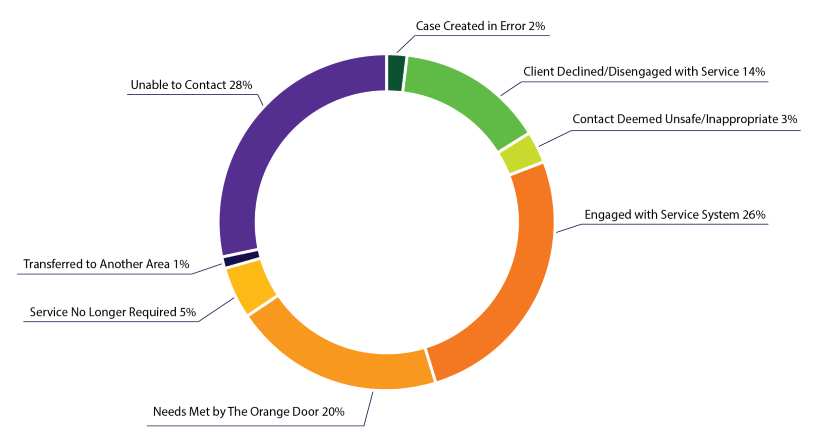The Orange Door will end their involvement with an individual or family for a number of reasons – these can include where the person’s needs are met, they are connected to a service that they need or in some cases a person will decide not to engage with the service; or could not be contacted despite multiple attempts by The Orange Door workforce.
The Orange Door recognises the agency of adults in choosing to engage or not engage with the range of supports provided by The Orange Door. In a minority of cases, where an unacceptable or unmanaged risk remains (such as to a child), The Orange Door practitioners will escalate the matter to statutory or emergency services.
In 2019-20, in nearly a third of cases The Orange Door was unable to make contact with the person referred, and in a further 14% of cases, the person chose not to take up the service offering. These proportions include perpetrators of family violence who were referred following incidents attended by police.
A fifth of all cases have their needs met by The Orange Door without requiring allocation of further support – this includes people seeking information and advice, crisis responses or their needs being met by through use of brokerage funds to purchase immediate supports (such as consumables or safety and security adaptations or repairs). A further quarter of all cases are connected to a service response to further meet their needs.
Figure 15: Cases closed in 2019-20

Building evidence from The Orange Door
The development of The Orange Door network has intentionally been an iterative process, with its initial design focusing on establishing a foundational service model which would be continually improved and expanded upon using insights gained through the ongoing statewide implementation.
Key learnings from staff, clients and stakeholder feedback, internal operations reviews, independent evaluations, and the recent Victorian Auditor-General’s Office audit have also contributed to the continuous improvement activities currently underway. Upcoming priorities include:
- refining the Client Relationship Management system to improve data collection and strengthen our understanding of outcomes for clients
- enhancing service connections, responses, and accessibility for individuals of any age, gender, ability, sex, sexuality, culture, or religion, including through the release and implementation of the Inclusion Action Plan for The Orange Door in 2021
- improving demand management practices
- ensuring the client voice continues to be prioritised, and that service responses support the specific needs of both adults and children
- strengthening Aboriginal inclusion, access, and equity, including through the establishment of Aboriginal Access points and embedding of the Aboriginal Inclusion Action Plan.
Work to build The Orange Door evidence base will be supported by cross government focus on coordinating and expanding research, data and evaluation activities as detailed in the Family Violence Rolling Action Plan 2020-2023. This work program acknowledges that improving the quality, availability and use of data is key to driving continuous improvement and underpins effective research and evaluation.
Updated